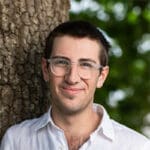Fighting for human rights, from remote communities to courtrooms

1 December 2023 at 9:00 am
Throughout David’s career, he has worked across a number of landmark legal and legislative reform campaigns, especially focused on first nations peoples. David has worked on ending indigenous deaths in custody, raising the age of criminal responsibility, protecting Country and Country defenders, the implementation of the Optional Protocol on the Convention Against Torture, and better resourcing for First Nations community led interventions in the criminal legal system.
In addition to his experience with first nations law reform, David has also worked in community development and health promotion, including HIV prevention and sexual and reproductive health rights as well as research to better meet the needs of LGBTIQ+ refugees and people seeking asylum.
David holds a Bachelor of Arts from La Trobe University with majors in anthropology and politics, a Juris Doctor from RMIT University and a Graduate Diploma in Legal Practice from the Australian National University. David Mejia-Canales is this weeks Pro Bono Australia change maker.
Describe your career trajectory and how you got to your current position.
I think I’ve always wanted to be a lawyer, ever since I went on a year 10 legal studies excursion to the Melbourne Magistrates Court. I remember thinking that the lawyers were speaking another language while they were in court, it was so fascinating to me. I decided right then and there that this was the career for me because I wanted to understand the legalese they were speaking. I did end up becoming a lawyer and had plenty of time in court rooms but I got to where I am now after a very convoluted career trajectory.
First I studied anthropology and politics which led me to work in community development projects for some time which was a lot of fun. After that I worked in HIV prevention in rural and regional communities, I think to this day this was the most fun job I’ve ever had. After ending up working at a call centre I decided to finally go to law school, I was admitted to legal practice in Victoria in 2013. Since then I have worked as a legal policy adviser in community legal centres, Aboriginal legal services, the Victorian as well as the Commonwealth Parliament. Now, I’m a senior lawyer in the Human Rights Law Centre’s Democratic Freedoms team where, among a whole lot of other things, I work to protect our right to peacefully protest. In between all of that I also worked at a gym as a fitness instructor, I was spruiking soil (literally) at Bunnings and I even was the guy in the Harold the Healthy Giraffe costume a couple of times. It’s been a convoluted but very fun career trajectory.
Can you tell us a bit more about what the Human Rights Law Centre is all about?
The Human Rights Law Centre is an independent, not-for-profit, NGO, we use strategic legal action, policy solutions and advocacy to support people and communities to eliminate inequality and injustice and build a fairer, more compassionate Australia. Some of the work that we do includes: strengthening the legal and institutional protection of human rights, promoting the human rights of people seeking asylum and refuge, migrant’s justice, protecting democratic freedoms (like the right to vote or to protest), partnering with Aboriginal and Torres Strait Islander peoples to promote their rights, ensuring prisons, youth justice centres and police cells comply with human rights, protecting reproductive health rights, ensuring Australian companies comply with human rights standards overseas, and promoting human rights through Australian domestic and foreign policy.
Take us through a typical day of work for you.
My day starts fairly early, I scan the newspapers at about 7am, earlier on a Commonwealth Parliament sitting day, to see if there are any issues in the media that I may need to respond to. Every single day is different in my job. Sometimes I may be helping colleagues prepare media releases or I may be fronting a press conference on an issue I’m working on, I might be meeting with politicians or other stakeholders to advance issues that we advocate for. I may be preparing written submissions to the Parliament or to government agencies on the issues I work on, sometimes I may even need to go and observe a protest to ensure that all protesters are having their rights protected or I may be helping my colleagues to prepare for court or I could be writing a report or a policy paper. There isn’t a typical day in my job, there’s always something new happening, it’s both exciting and very rewarding.
What is the biggest challenge you’ve encountered in your career, and how did you overcome it?
After I finished law school I ended up working in commercial litigation for a short period of time and it was awful, truly awful. I hated every moment of working there and by extension I hated everything to do with the law. There I was a young grad with a $100,000 HECS debt and a piece of paper allowing me to practice law and I hated every last thing about all of it. The whole affair sunk me into a deep depression and a crisis of confidence to the point that I ended up just working as a group fitness instructor with no plans to go back to law. I did that until I could land back on my feet and try to find a use for my very expensive law degree, all in all I had a year and a half of doing everything else but law. Thankfully, I was surrounded by good people who encouraged me to take whatever time I needed to recover, repurpose and then re-enter the profession, which I did and I’m forever thankful I kept at it.
If you could go back in time, what piece of advice would you give yourself as you first embarked on your career?
I would tell myself to rest. I would make sure younger me knows that he is a very finite resource and that he must rest and take excellent care of himself if he is going to be of service to others.
How do you unwind after work?
I’m very lucky to have a swimming pool at the end of my street so after work I go do laps at the pool or I’ll go for a swim in Sydney Harbour- thankfully the Harbour is also on my way home so I’m spoilt for swimming choices. If I don’t swim I’ll go for a bike ride if the weather allows it- yoga if it doesn’t. I like doing something active to unwind, if I’m focused on exercise then I can’t think about work or anything else.
What was the last thing you watched, read or listened to?
I watched Killers of the Flower Moon (not bad) , I listened to Beyonce’s Renaissance (superb) and I read ‘Salvador’ an essay by Joan Didion about my first home, El Salvador.







